Nursing Informatics: Benefits, Roles, and Future Directions in Care
VerifiedAdded on 2023/04/07
|9
|1871
|176
Essay
AI Summary
This essay provides an in-depth exploration of nursing informatics, highlighting its role in integrating nursing science with information management and analytical sciences to improve healthcare delivery and patient outcomes. It discusses the core components of nursing communication—data, information, and knowledge—and how they are utilized in computer programs and software to assist healthcare professionals. The essay examines the diverse roles of nurse informaticians, from developers and educators to policy developers, and their involvement in crucial areas such as evidence-based practices and interoperable data infrastructure. Furthermore, it elucidates the benefits of nursing informatics, including improved equipment tracking, reduced medication errors, enhanced decision-making through systems like MEWS, and streamlined documentation processes. The essay concludes by emphasizing the importance of collaboration between leaders and point-of-care professionals for successful adoption of nursing informatics, underscoring its growing significance and the increasing demand for nursing informaticists in modern healthcare.
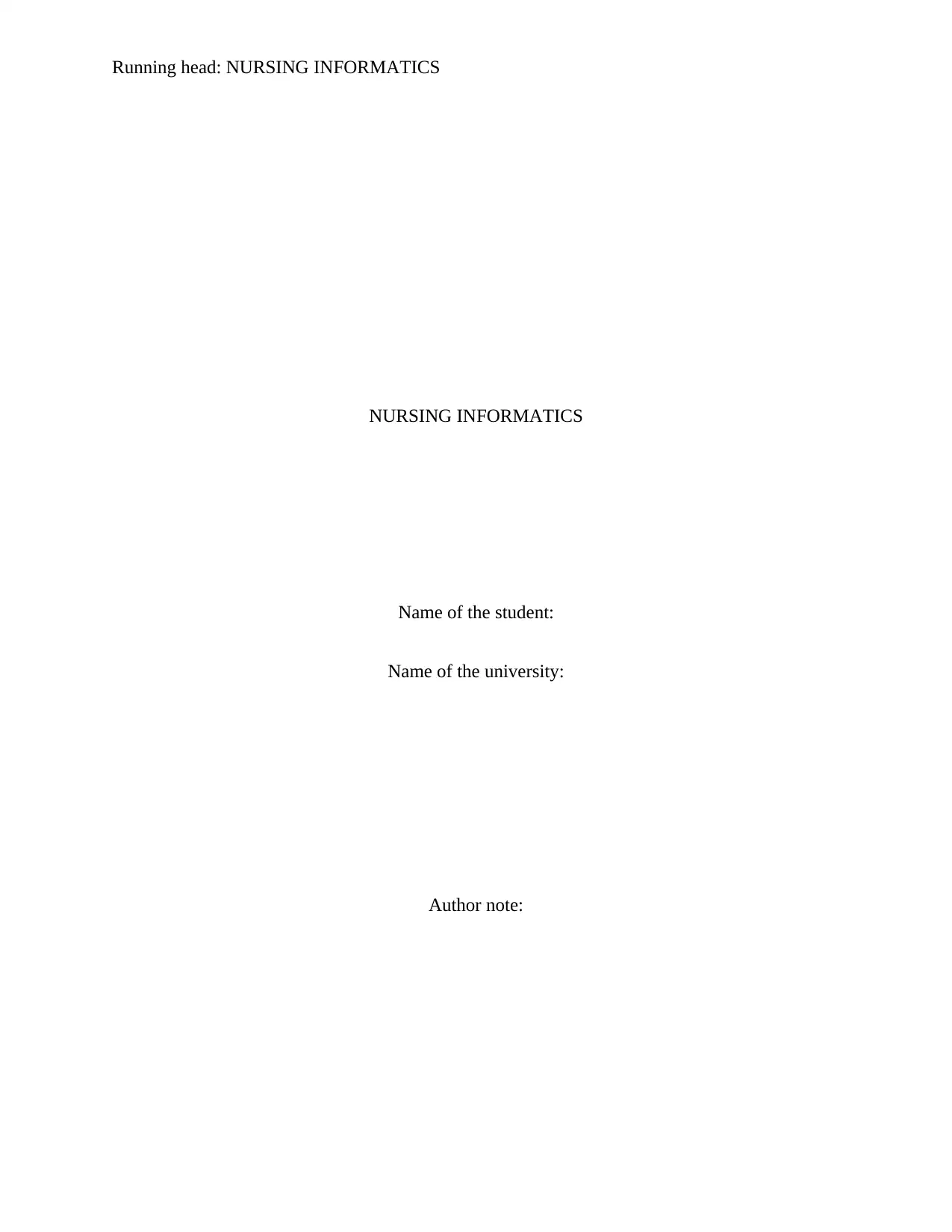
Running head: NURSING INFORMATICS
NURSING INFORMATICS
Name of the student:
Name of the university:
Author note:
NURSING INFORMATICS
Name of the student:
Name of the university:
Author note:
Paraphrase This Document
Need a fresh take? Get an instant paraphrase of this document with our AI Paraphraser
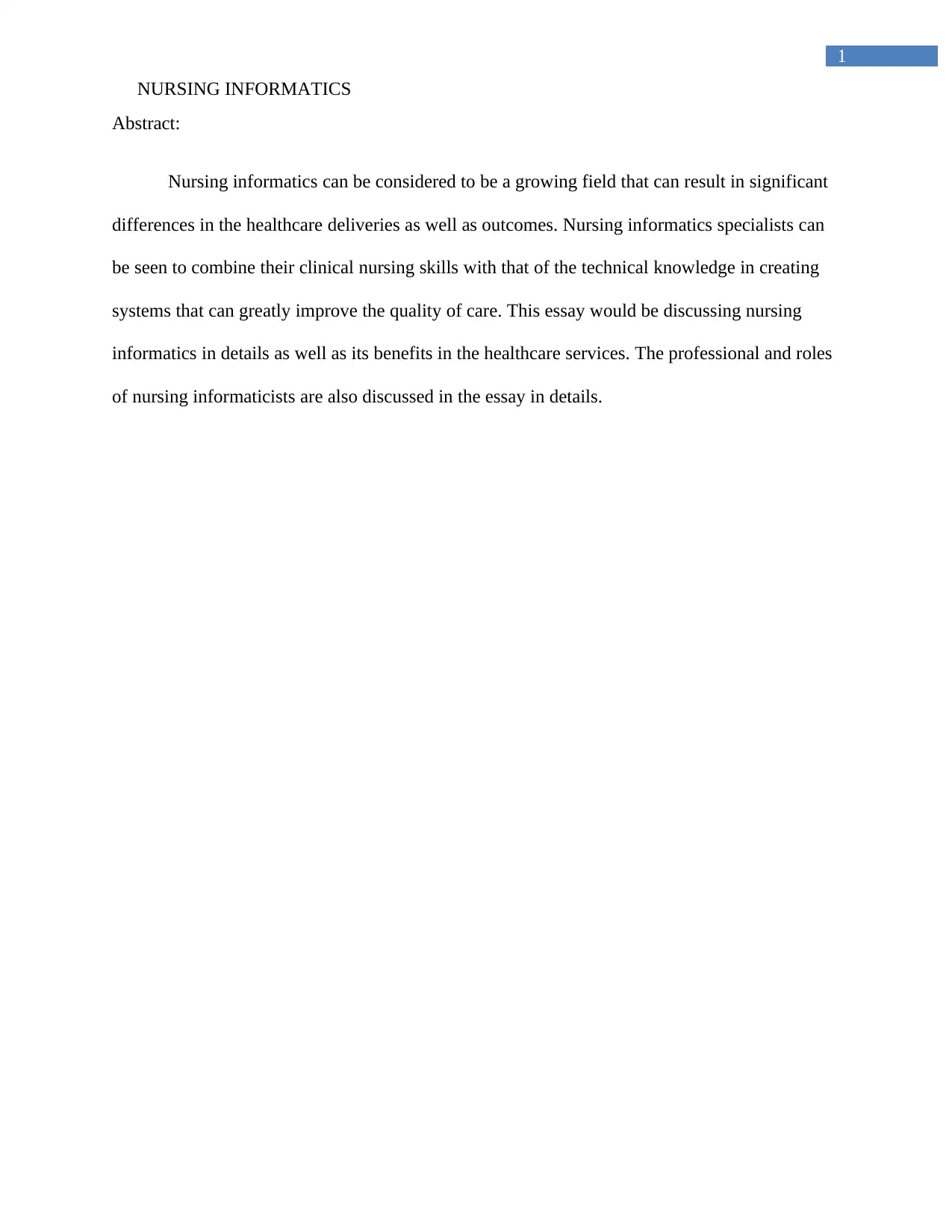
1
NURSING INFORMATICS
Abstract:
Nursing informatics can be considered to be a growing field that can result in significant
differences in the healthcare deliveries as well as outcomes. Nursing informatics specialists can
be seen to combine their clinical nursing skills with that of the technical knowledge in creating
systems that can greatly improve the quality of care. This essay would be discussing nursing
informatics in details as well as its benefits in the healthcare services. The professional and roles
of nursing informaticists are also discussed in the essay in details.
NURSING INFORMATICS
Abstract:
Nursing informatics can be considered to be a growing field that can result in significant
differences in the healthcare deliveries as well as outcomes. Nursing informatics specialists can
be seen to combine their clinical nursing skills with that of the technical knowledge in creating
systems that can greatly improve the quality of care. This essay would be discussing nursing
informatics in details as well as its benefits in the healthcare services. The professional and roles
of nursing informaticists are also discussed in the essay in details.
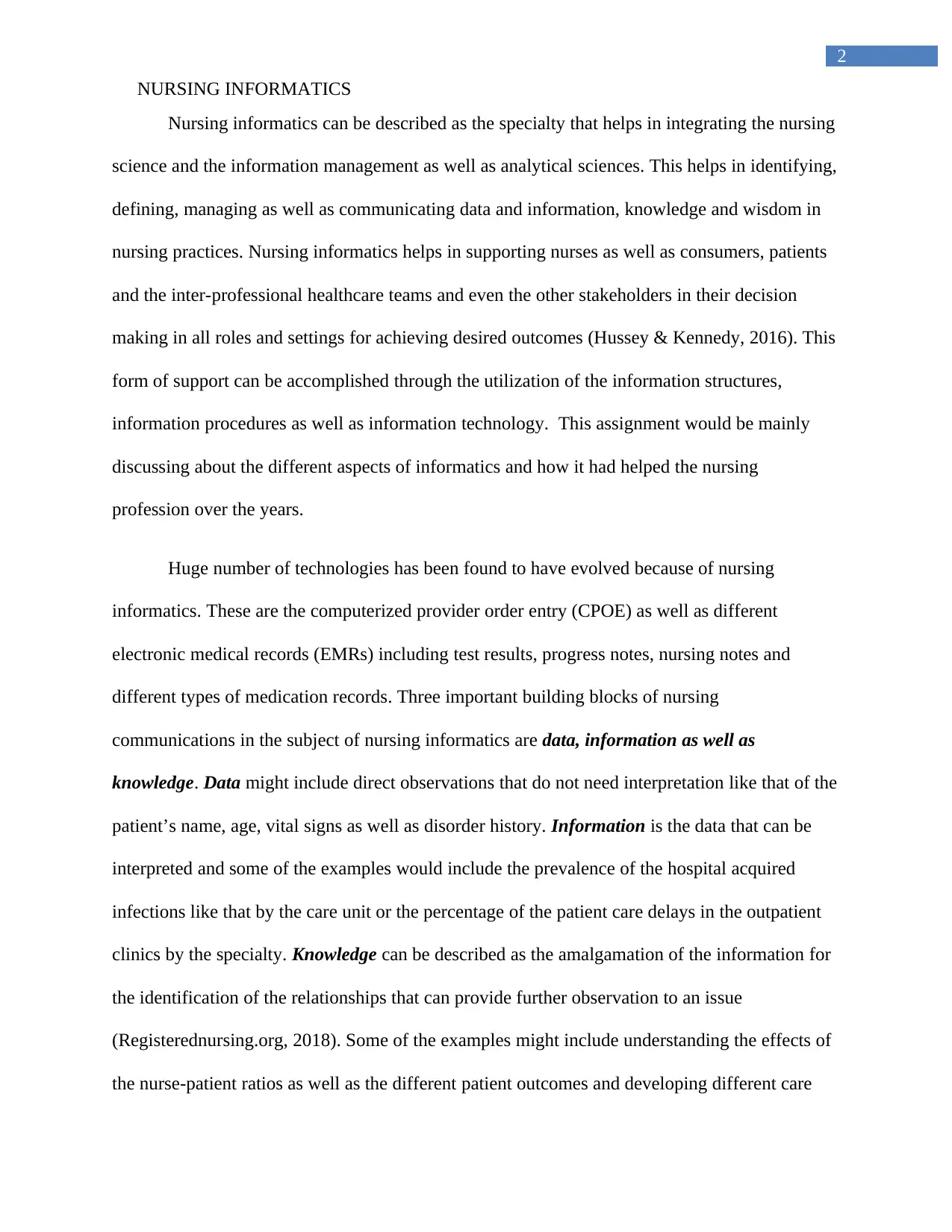
2
NURSING INFORMATICS
Nursing informatics can be described as the specialty that helps in integrating the nursing
science and the information management as well as analytical sciences. This helps in identifying,
defining, managing as well as communicating data and information, knowledge and wisdom in
nursing practices. Nursing informatics helps in supporting nurses as well as consumers, patients
and the inter-professional healthcare teams and even the other stakeholders in their decision
making in all roles and settings for achieving desired outcomes (Hussey & Kennedy, 2016). This
form of support can be accomplished through the utilization of the information structures,
information procedures as well as information technology. This assignment would be mainly
discussing about the different aspects of informatics and how it had helped the nursing
profession over the years.
Huge number of technologies has been found to have evolved because of nursing
informatics. These are the computerized provider order entry (CPOE) as well as different
electronic medical records (EMRs) including test results, progress notes, nursing notes and
different types of medication records. Three important building blocks of nursing
communications in the subject of nursing informatics are data, information as well as
knowledge. Data might include direct observations that do not need interpretation like that of the
patient’s name, age, vital signs as well as disorder history. Information is the data that can be
interpreted and some of the examples would include the prevalence of the hospital acquired
infections like that by the care unit or the percentage of the patient care delays in the outpatient
clinics by the specialty. Knowledge can be described as the amalgamation of the information for
the identification of the relationships that can provide further observation to an issue
(Registerednursing.org, 2018). Some of the examples might include understanding the effects of
the nurse-patient ratios as well as the different patient outcomes and developing different care
NURSING INFORMATICS
Nursing informatics can be described as the specialty that helps in integrating the nursing
science and the information management as well as analytical sciences. This helps in identifying,
defining, managing as well as communicating data and information, knowledge and wisdom in
nursing practices. Nursing informatics helps in supporting nurses as well as consumers, patients
and the inter-professional healthcare teams and even the other stakeholders in their decision
making in all roles and settings for achieving desired outcomes (Hussey & Kennedy, 2016). This
form of support can be accomplished through the utilization of the information structures,
information procedures as well as information technology. This assignment would be mainly
discussing about the different aspects of informatics and how it had helped the nursing
profession over the years.
Huge number of technologies has been found to have evolved because of nursing
informatics. These are the computerized provider order entry (CPOE) as well as different
electronic medical records (EMRs) including test results, progress notes, nursing notes and
different types of medication records. Three important building blocks of nursing
communications in the subject of nursing informatics are data, information as well as
knowledge. Data might include direct observations that do not need interpretation like that of the
patient’s name, age, vital signs as well as disorder history. Information is the data that can be
interpreted and some of the examples would include the prevalence of the hospital acquired
infections like that by the care unit or the percentage of the patient care delays in the outpatient
clinics by the specialty. Knowledge can be described as the amalgamation of the information for
the identification of the relationships that can provide further observation to an issue
(Registerednursing.org, 2018). Some of the examples might include understanding the effects of
the nurse-patient ratios as well as the different patient outcomes and developing different care
⊘ This is a preview!⊘
Do you want full access?
Subscribe today to unlock all pages.

Trusted by 1+ million students worldwide
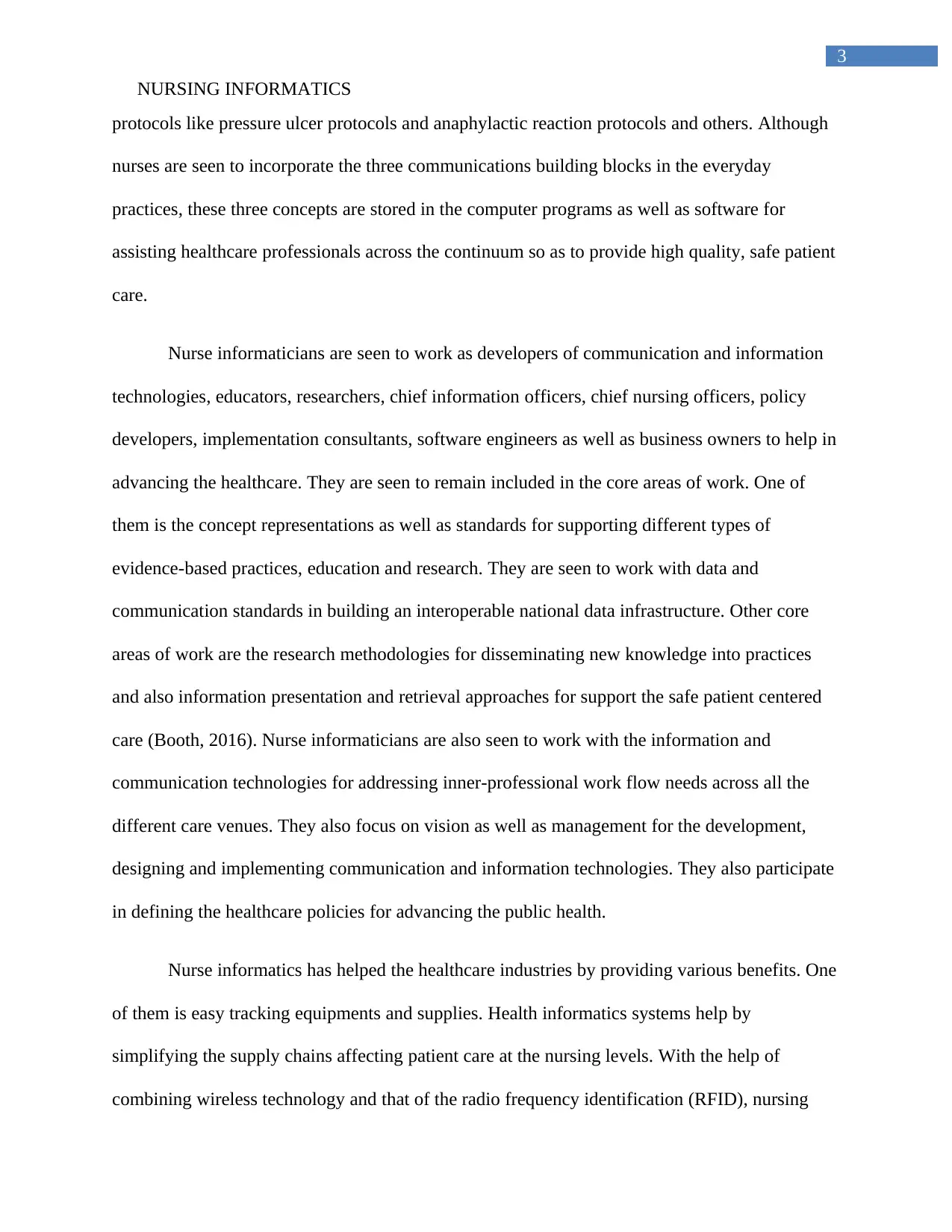
3
NURSING INFORMATICS
protocols like pressure ulcer protocols and anaphylactic reaction protocols and others. Although
nurses are seen to incorporate the three communications building blocks in the everyday
practices, these three concepts are stored in the computer programs as well as software for
assisting healthcare professionals across the continuum so as to provide high quality, safe patient
care.
Nurse informaticians are seen to work as developers of communication and information
technologies, educators, researchers, chief information officers, chief nursing officers, policy
developers, implementation consultants, software engineers as well as business owners to help in
advancing the healthcare. They are seen to remain included in the core areas of work. One of
them is the concept representations as well as standards for supporting different types of
evidence-based practices, education and research. They are seen to work with data and
communication standards in building an interoperable national data infrastructure. Other core
areas of work are the research methodologies for disseminating new knowledge into practices
and also information presentation and retrieval approaches for support the safe patient centered
care (Booth, 2016). Nurse informaticians are also seen to work with the information and
communication technologies for addressing inner-professional work flow needs across all the
different care venues. They also focus on vision as well as management for the development,
designing and implementing communication and information technologies. They also participate
in defining the healthcare policies for advancing the public health.
Nurse informatics has helped the healthcare industries by providing various benefits. One
of them is easy tracking equipments and supplies. Health informatics systems help by
simplifying the supply chains affecting patient care at the nursing levels. With the help of
combining wireless technology and that of the radio frequency identification (RFID), nursing
NURSING INFORMATICS
protocols like pressure ulcer protocols and anaphylactic reaction protocols and others. Although
nurses are seen to incorporate the three communications building blocks in the everyday
practices, these three concepts are stored in the computer programs as well as software for
assisting healthcare professionals across the continuum so as to provide high quality, safe patient
care.
Nurse informaticians are seen to work as developers of communication and information
technologies, educators, researchers, chief information officers, chief nursing officers, policy
developers, implementation consultants, software engineers as well as business owners to help in
advancing the healthcare. They are seen to remain included in the core areas of work. One of
them is the concept representations as well as standards for supporting different types of
evidence-based practices, education and research. They are seen to work with data and
communication standards in building an interoperable national data infrastructure. Other core
areas of work are the research methodologies for disseminating new knowledge into practices
and also information presentation and retrieval approaches for support the safe patient centered
care (Booth, 2016). Nurse informaticians are also seen to work with the information and
communication technologies for addressing inner-professional work flow needs across all the
different care venues. They also focus on vision as well as management for the development,
designing and implementing communication and information technologies. They also participate
in defining the healthcare policies for advancing the public health.
Nurse informatics has helped the healthcare industries by providing various benefits. One
of them is easy tracking equipments and supplies. Health informatics systems help by
simplifying the supply chains affecting patient care at the nursing levels. With the help of
combining wireless technology and that of the radio frequency identification (RFID), nursing
Paraphrase This Document
Need a fresh take? Get an instant paraphrase of this document with our AI Paraphraser
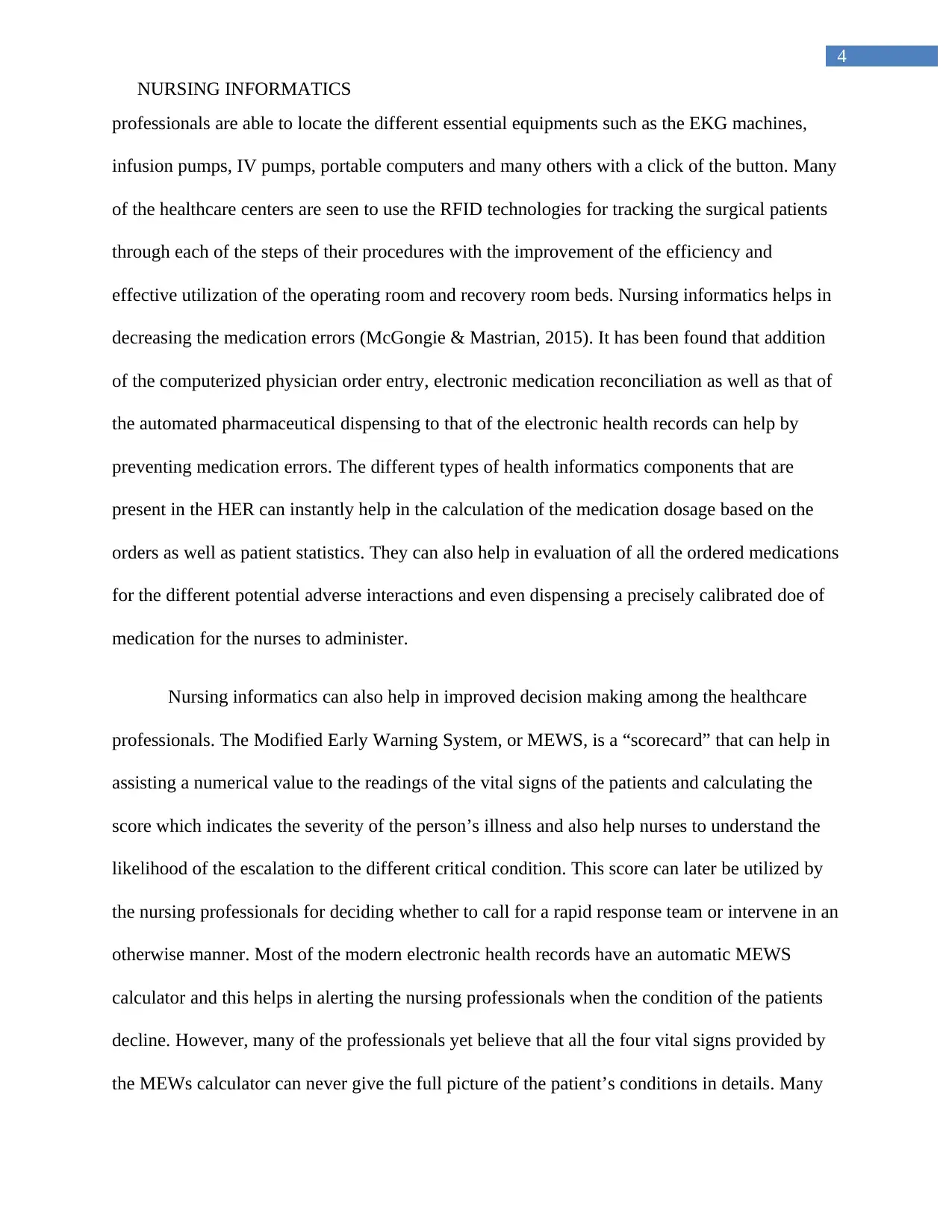
4
NURSING INFORMATICS
professionals are able to locate the different essential equipments such as the EKG machines,
infusion pumps, IV pumps, portable computers and many others with a click of the button. Many
of the healthcare centers are seen to use the RFID technologies for tracking the surgical patients
through each of the steps of their procedures with the improvement of the efficiency and
effective utilization of the operating room and recovery room beds. Nursing informatics helps in
decreasing the medication errors (McGongie & Mastrian, 2015). It has been found that addition
of the computerized physician order entry, electronic medication reconciliation as well as that of
the automated pharmaceutical dispensing to that of the electronic health records can help by
preventing medication errors. The different types of health informatics components that are
present in the HER can instantly help in the calculation of the medication dosage based on the
orders as well as patient statistics. They can also help in evaluation of all the ordered medications
for the different potential adverse interactions and even dispensing a precisely calibrated doe of
medication for the nurses to administer.
Nursing informatics can also help in improved decision making among the healthcare
professionals. The Modified Early Warning System, or MEWS, is a “scorecard” that can help in
assisting a numerical value to the readings of the vital signs of the patients and calculating the
score which indicates the severity of the person’s illness and also help nurses to understand the
likelihood of the escalation to the different critical condition. This score can later be utilized by
the nursing professionals for deciding whether to call for a rapid response team or intervene in an
otherwise manner. Most of the modern electronic health records have an automatic MEWS
calculator and this helps in alerting the nursing professionals when the condition of the patients
decline. However, many of the professionals yet believe that all the four vital signs provided by
the MEWs calculator can never give the full picture of the patient’s conditions in details. Many
NURSING INFORMATICS
professionals are able to locate the different essential equipments such as the EKG machines,
infusion pumps, IV pumps, portable computers and many others with a click of the button. Many
of the healthcare centers are seen to use the RFID technologies for tracking the surgical patients
through each of the steps of their procedures with the improvement of the efficiency and
effective utilization of the operating room and recovery room beds. Nursing informatics helps in
decreasing the medication errors (McGongie & Mastrian, 2015). It has been found that addition
of the computerized physician order entry, electronic medication reconciliation as well as that of
the automated pharmaceutical dispensing to that of the electronic health records can help by
preventing medication errors. The different types of health informatics components that are
present in the HER can instantly help in the calculation of the medication dosage based on the
orders as well as patient statistics. They can also help in evaluation of all the ordered medications
for the different potential adverse interactions and even dispensing a precisely calibrated doe of
medication for the nurses to administer.
Nursing informatics can also help in improved decision making among the healthcare
professionals. The Modified Early Warning System, or MEWS, is a “scorecard” that can help in
assisting a numerical value to the readings of the vital signs of the patients and calculating the
score which indicates the severity of the person’s illness and also help nurses to understand the
likelihood of the escalation to the different critical condition. This score can later be utilized by
the nursing professionals for deciding whether to call for a rapid response team or intervene in an
otherwise manner. Most of the modern electronic health records have an automatic MEWS
calculator and this helps in alerting the nursing professionals when the condition of the patients
decline. However, many of the professionals yet believe that all the four vital signs provided by
the MEWs calculator can never give the full picture of the patient’s conditions in details. Many
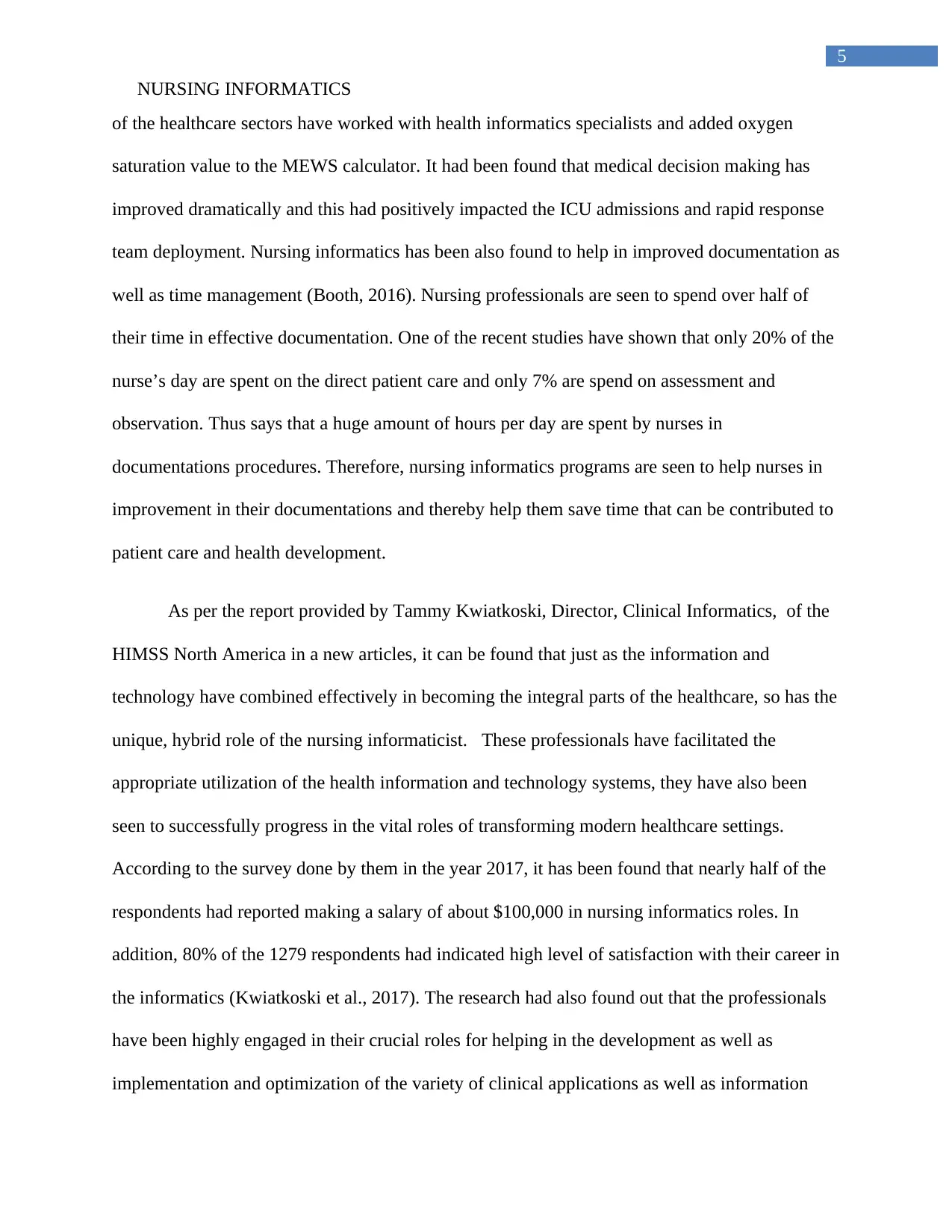
5
NURSING INFORMATICS
of the healthcare sectors have worked with health informatics specialists and added oxygen
saturation value to the MEWS calculator. It had been found that medical decision making has
improved dramatically and this had positively impacted the ICU admissions and rapid response
team deployment. Nursing informatics has been also found to help in improved documentation as
well as time management (Booth, 2016). Nursing professionals are seen to spend over half of
their time in effective documentation. One of the recent studies have shown that only 20% of the
nurse’s day are spent on the direct patient care and only 7% are spend on assessment and
observation. Thus says that a huge amount of hours per day are spent by nurses in
documentations procedures. Therefore, nursing informatics programs are seen to help nurses in
improvement in their documentations and thereby help them save time that can be contributed to
patient care and health development.
As per the report provided by Tammy Kwiatkoski, Director, Clinical Informatics, of the
HIMSS North America in a new articles, it can be found that just as the information and
technology have combined effectively in becoming the integral parts of the healthcare, so has the
unique, hybrid role of the nursing informaticist. These professionals have facilitated the
appropriate utilization of the health information and technology systems, they have also been
seen to successfully progress in the vital roles of transforming modern healthcare settings.
According to the survey done by them in the year 2017, it has been found that nearly half of the
respondents had reported making a salary of about $100,000 in nursing informatics roles. In
addition, 80% of the 1279 respondents had indicated high level of satisfaction with their career in
the informatics (Kwiatkoski et al., 2017). The research had also found out that the professionals
have been highly engaged in their crucial roles for helping in the development as well as
implementation and optimization of the variety of clinical applications as well as information
NURSING INFORMATICS
of the healthcare sectors have worked with health informatics specialists and added oxygen
saturation value to the MEWS calculator. It had been found that medical decision making has
improved dramatically and this had positively impacted the ICU admissions and rapid response
team deployment. Nursing informatics has been also found to help in improved documentation as
well as time management (Booth, 2016). Nursing professionals are seen to spend over half of
their time in effective documentation. One of the recent studies have shown that only 20% of the
nurse’s day are spent on the direct patient care and only 7% are spend on assessment and
observation. Thus says that a huge amount of hours per day are spent by nurses in
documentations procedures. Therefore, nursing informatics programs are seen to help nurses in
improvement in their documentations and thereby help them save time that can be contributed to
patient care and health development.
As per the report provided by Tammy Kwiatkoski, Director, Clinical Informatics, of the
HIMSS North America in a new articles, it can be found that just as the information and
technology have combined effectively in becoming the integral parts of the healthcare, so has the
unique, hybrid role of the nursing informaticist. These professionals have facilitated the
appropriate utilization of the health information and technology systems, they have also been
seen to successfully progress in the vital roles of transforming modern healthcare settings.
According to the survey done by them in the year 2017, it has been found that nearly half of the
respondents had reported making a salary of about $100,000 in nursing informatics roles. In
addition, 80% of the 1279 respondents had indicated high level of satisfaction with their career in
the informatics (Kwiatkoski et al., 2017). The research had also found out that the professionals
have been highly engaged in their crucial roles for helping in the development as well as
implementation and optimization of the variety of clinical applications as well as information
⊘ This is a preview!⊘
Do you want full access?
Subscribe today to unlock all pages.

Trusted by 1+ million students worldwide
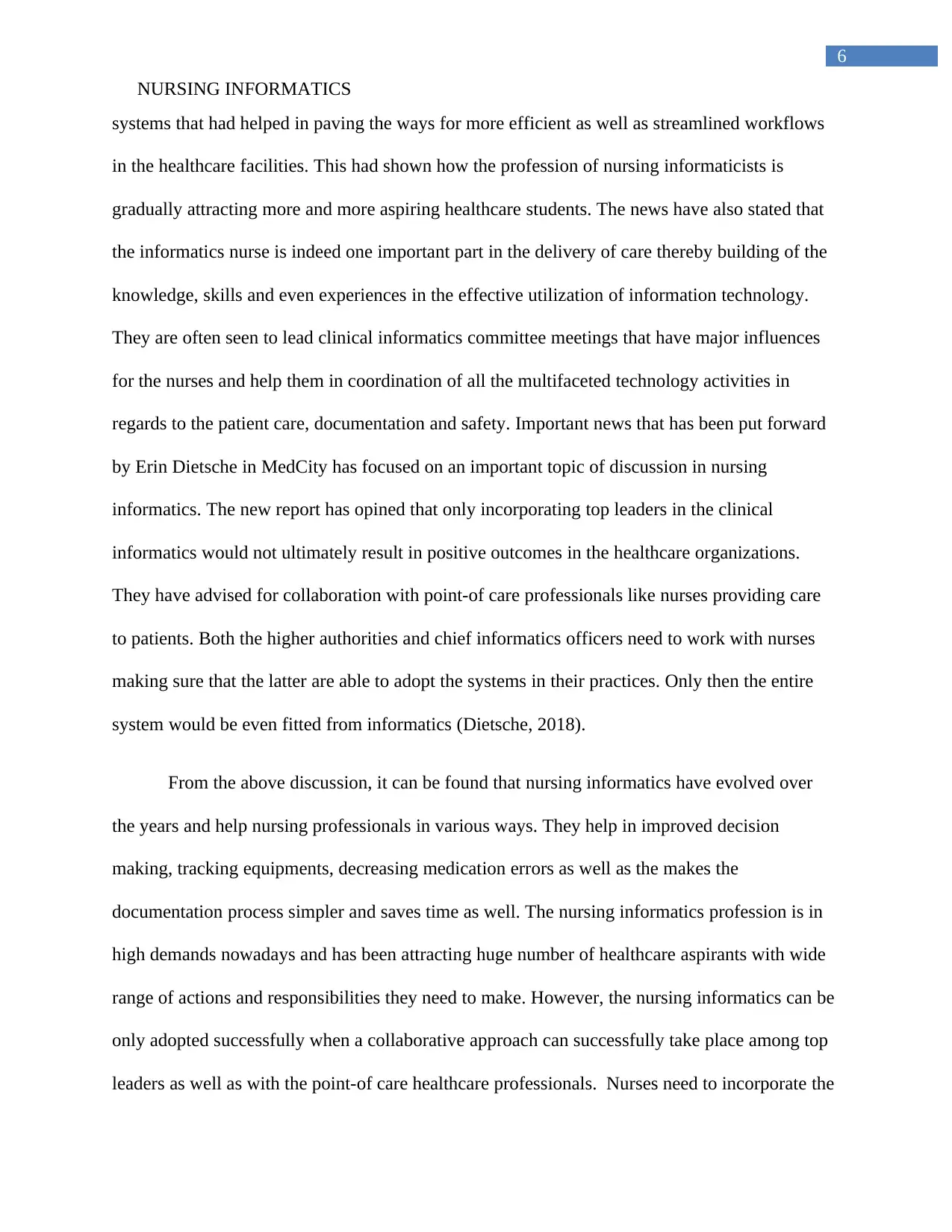
6
NURSING INFORMATICS
systems that had helped in paving the ways for more efficient as well as streamlined workflows
in the healthcare facilities. This had shown how the profession of nursing informaticists is
gradually attracting more and more aspiring healthcare students. The news have also stated that
the informatics nurse is indeed one important part in the delivery of care thereby building of the
knowledge, skills and even experiences in the effective utilization of information technology.
They are often seen to lead clinical informatics committee meetings that have major influences
for the nurses and help them in coordination of all the multifaceted technology activities in
regards to the patient care, documentation and safety. Important news that has been put forward
by Erin Dietsche in MedCity has focused on an important topic of discussion in nursing
informatics. The new report has opined that only incorporating top leaders in the clinical
informatics would not ultimately result in positive outcomes in the healthcare organizations.
They have advised for collaboration with point-of care professionals like nurses providing care
to patients. Both the higher authorities and chief informatics officers need to work with nurses
making sure that the latter are able to adopt the systems in their practices. Only then the entire
system would be even fitted from informatics (Dietsche, 2018).
From the above discussion, it can be found that nursing informatics have evolved over
the years and help nursing professionals in various ways. They help in improved decision
making, tracking equipments, decreasing medication errors as well as the makes the
documentation process simpler and saves time as well. The nursing informatics profession is in
high demands nowadays and has been attracting huge number of healthcare aspirants with wide
range of actions and responsibilities they need to make. However, the nursing informatics can be
only adopted successfully when a collaborative approach can successfully take place among top
leaders as well as with the point-of care healthcare professionals. Nurses need to incorporate the
NURSING INFORMATICS
systems that had helped in paving the ways for more efficient as well as streamlined workflows
in the healthcare facilities. This had shown how the profession of nursing informaticists is
gradually attracting more and more aspiring healthcare students. The news have also stated that
the informatics nurse is indeed one important part in the delivery of care thereby building of the
knowledge, skills and even experiences in the effective utilization of information technology.
They are often seen to lead clinical informatics committee meetings that have major influences
for the nurses and help them in coordination of all the multifaceted technology activities in
regards to the patient care, documentation and safety. Important news that has been put forward
by Erin Dietsche in MedCity has focused on an important topic of discussion in nursing
informatics. The new report has opined that only incorporating top leaders in the clinical
informatics would not ultimately result in positive outcomes in the healthcare organizations.
They have advised for collaboration with point-of care professionals like nurses providing care
to patients. Both the higher authorities and chief informatics officers need to work with nurses
making sure that the latter are able to adopt the systems in their practices. Only then the entire
system would be even fitted from informatics (Dietsche, 2018).
From the above discussion, it can be found that nursing informatics have evolved over
the years and help nursing professionals in various ways. They help in improved decision
making, tracking equipments, decreasing medication errors as well as the makes the
documentation process simpler and saves time as well. The nursing informatics profession is in
high demands nowadays and has been attracting huge number of healthcare aspirants with wide
range of actions and responsibilities they need to make. However, the nursing informatics can be
only adopted successfully when a collaborative approach can successfully take place among top
leaders as well as with the point-of care healthcare professionals. Nurses need to incorporate the
Paraphrase This Document
Need a fresh take? Get an instant paraphrase of this document with our AI Paraphraser
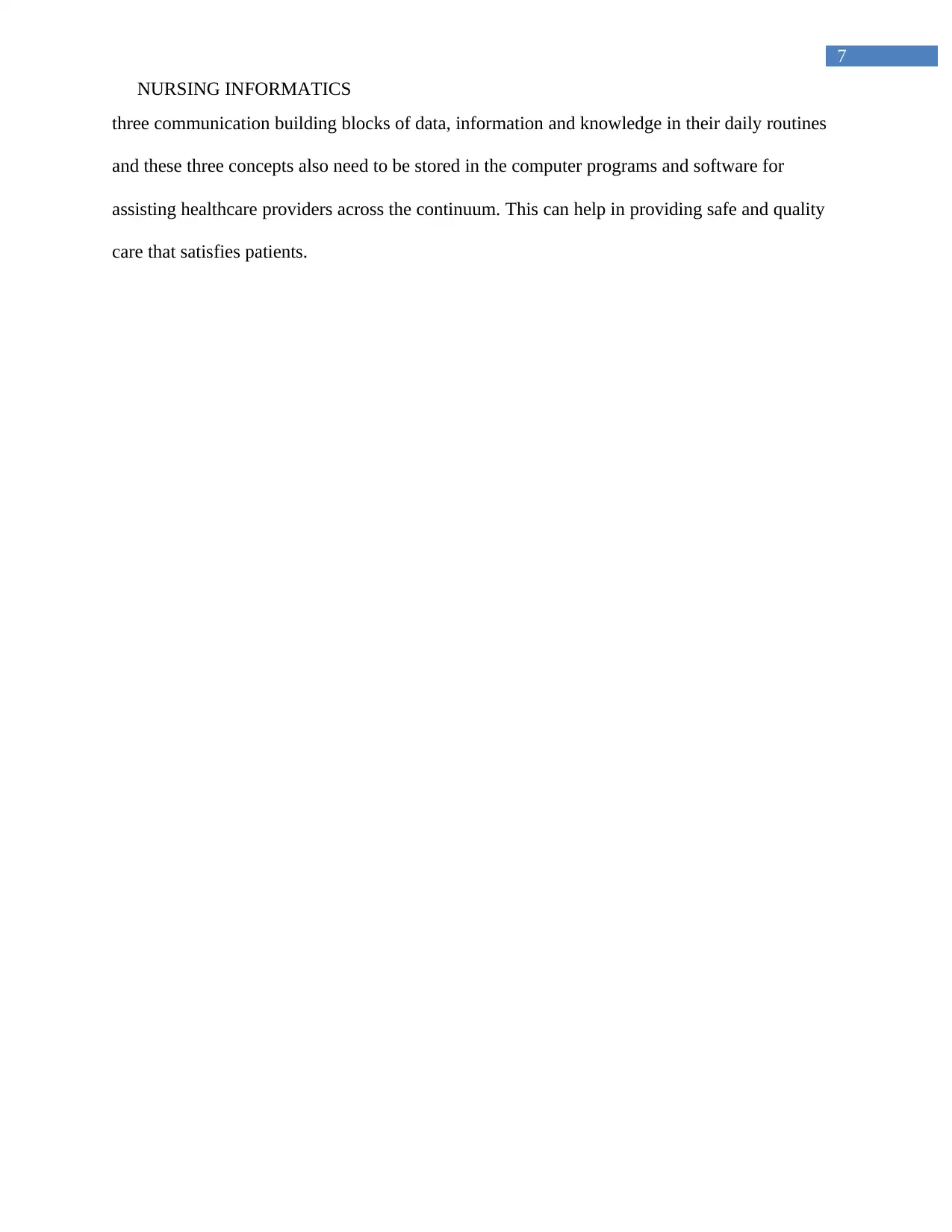
7
NURSING INFORMATICS
three communication building blocks of data, information and knowledge in their daily routines
and these three concepts also need to be stored in the computer programs and software for
assisting healthcare providers across the continuum. This can help in providing safe and quality
care that satisfies patients.
NURSING INFORMATICS
three communication building blocks of data, information and knowledge in their daily routines
and these three concepts also need to be stored in the computer programs and software for
assisting healthcare providers across the continuum. This can help in providing safe and quality
care that satisfies patients.
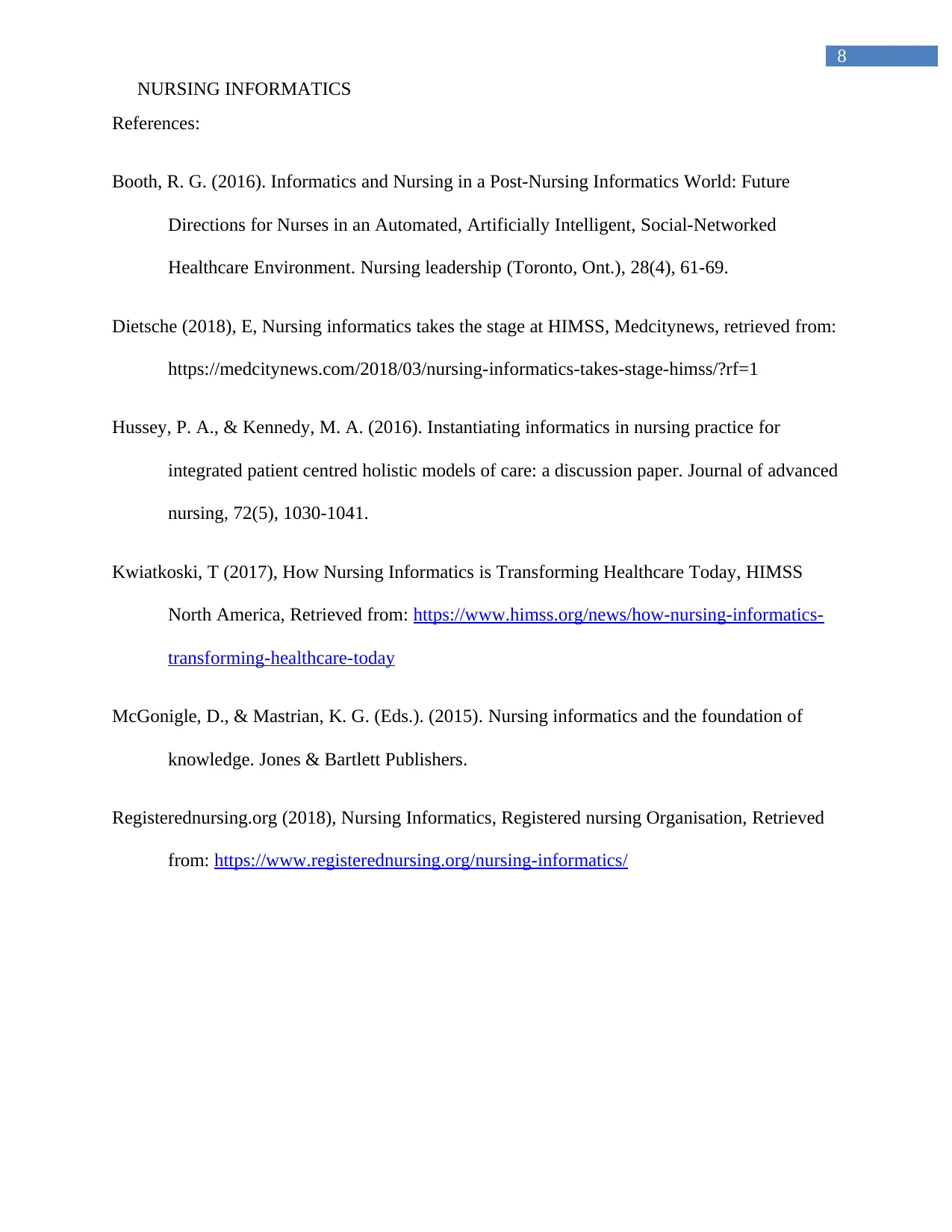
8
NURSING INFORMATICS
References:
Booth, R. G. (2016). Informatics and Nursing in a Post-Nursing Informatics World: Future
Directions for Nurses in an Automated, Artificially Intelligent, Social-Networked
Healthcare Environment. Nursing leadership (Toronto, Ont.), 28(4), 61-69.
Dietsche (2018), E, Nursing informatics takes the stage at HIMSS, Medcitynews, retrieved from:
https://medcitynews.com/2018/03/nursing-informatics-takes-stage-himss/?rf=1
Hussey, P. A., & Kennedy, M. A. (2016). Instantiating informatics in nursing practice for
integrated patient centred holistic models of care: a discussion paper. Journal of advanced
nursing, 72(5), 1030-1041.
Kwiatkoski, T (2017), How Nursing Informatics is Transforming Healthcare Today, HIMSS
North America, Retrieved from: https://www.himss.org/news/how-nursing-informatics-
transforming-healthcare-today
McGonigle, D., & Mastrian, K. G. (Eds.). (2015). Nursing informatics and the foundation of
knowledge. Jones & Bartlett Publishers.
Registerednursing.org (2018), Nursing Informatics, Registered nursing Organisation, Retrieved
from: https://www.registerednursing.org/nursing-informatics/
NURSING INFORMATICS
References:
Booth, R. G. (2016). Informatics and Nursing in a Post-Nursing Informatics World: Future
Directions for Nurses in an Automated, Artificially Intelligent, Social-Networked
Healthcare Environment. Nursing leadership (Toronto, Ont.), 28(4), 61-69.
Dietsche (2018), E, Nursing informatics takes the stage at HIMSS, Medcitynews, retrieved from:
https://medcitynews.com/2018/03/nursing-informatics-takes-stage-himss/?rf=1
Hussey, P. A., & Kennedy, M. A. (2016). Instantiating informatics in nursing practice for
integrated patient centred holistic models of care: a discussion paper. Journal of advanced
nursing, 72(5), 1030-1041.
Kwiatkoski, T (2017), How Nursing Informatics is Transforming Healthcare Today, HIMSS
North America, Retrieved from: https://www.himss.org/news/how-nursing-informatics-
transforming-healthcare-today
McGonigle, D., & Mastrian, K. G. (Eds.). (2015). Nursing informatics and the foundation of
knowledge. Jones & Bartlett Publishers.
Registerednursing.org (2018), Nursing Informatics, Registered nursing Organisation, Retrieved
from: https://www.registerednursing.org/nursing-informatics/
⊘ This is a preview!⊘
Do you want full access?
Subscribe today to unlock all pages.

Trusted by 1+ million students worldwide
1 out of 9
Related Documents
Your All-in-One AI-Powered Toolkit for Academic Success.
+13062052269
info@desklib.com
Available 24*7 on WhatsApp / Email
![[object Object]](/_next/static/media/star-bottom.7253800d.svg)
Unlock your academic potential
Copyright © 2020–2026 A2Z Services. All Rights Reserved. Developed and managed by ZUCOL.





